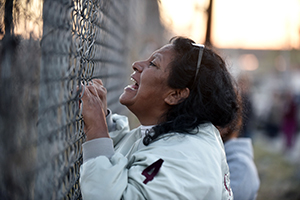MEXICO CITY –– A prison riot in the northern Mexican city of Monterrey has claimed 49 lives, offering another example  A relative of a prisoner pleads for information after a Feb. 11 riot at the Topo Chico prison in Monterrey, Mexico. The riot claimed at least 52 lives, offering another example of the problems plaguing Mexico’s prison system and casting a pall over the arrival of Pope Francis in the country. (CNS photo/Miguel Sierra, EPA)of the problems plaguing Mexico’s prison system and casting a pall over the arrival of Pope Francis in the country.
A relative of a prisoner pleads for information after a Feb. 11 riot at the Topo Chico prison in Monterrey, Mexico. The riot claimed at least 52 lives, offering another example of the problems plaguing Mexico’s prison system and casting a pall over the arrival of Pope Francis in the country. (CNS photo/Miguel Sierra, EPA)of the problems plaguing Mexico’s prison system and casting a pall over the arrival of Pope Francis in the country.
Nuevo Leon Gov. Jaime Rodriguez Calderon confirmed the death toll Feb. 11 and attributed the bloodshed to a clash between groups led by incarcerated leaders of the Gulf Cartel and Los Zetas. The criminal groups, which were once partners, have fought for control of crime and smuggling territories in Mexico’s northeastern states.
The clash in the Topo Chico prison came just one day before Pope Francis was to arrive in Mexico City for a six-day trip in which he was expected to address issues such as insecurity, corruption and violence.
In a message sent Feb. 12 to Archbishop Rogelio Cabrera Lopez of Monterrey, Cardinal Pietro Parolin, Vatican secretary of state, conveyed Pope Francis’ condolences about Topo Chico. The pope offered prayers “for the eternal rest of the deceased” as well as expressing his “spiritual closeness” to their families and a quick recovery for the injured.
Pope Francis’ agenda includes a Feb. 17 visit to the once-notorious Cereso prison in the border city of Ciudad Juarez.
State officials say the Ciudad Juarez prison has improved in recent years, with gangs no longer ordering crimes in the city from behind bars, though priests working in the diocesan prison ministry and with the families of inmates say problems persist such as inmates having to pay for protection and privileges.
“There’s a certain control by groups inside the prison. This has not completely been eradicated,” said Fr. Oscar Enriquez, director of the Paso del Norte Human Rights Center in Ciudad Juarez. He works with families with relatives inside Cereso prison.
A 2014 report on correctional facilities from the National Human Rights Commission found widespread problems persisting in Mexican prisons such as overcrowding, self-rule and inmates awaiting trial being locked up with those already sentenced.
“Topo Chico had an occupancy rate of 156 percent” in 2013, said Jorge Kawas, security researcher and analyst in Monterrey. “Like most local prisons, it is also underfunded and pretty much ungovernable.”
Fr. Robert Coogan, an American prison chaplain in Saltillo, 30 miles west of Monterrey, said the Topo Chico prison suffered from self-rule.
“They know how to calm the authorities down by doing things that are pleasing to the authorities,” Fr. Coogan said, pointing to the way inmate leaders will keep prisons with self-rule clean, maintained and orderly as a way to keep wardens on their side.
“The reason for (inmates) controlling the prison is that you cannot have an escape every time someone comes in. But sometimes they will use their manipulation … to get the people they want to release all in one place. Once they get them in one place, then they’ll set them free.”
Contributing to this story was Junno Arocho.
